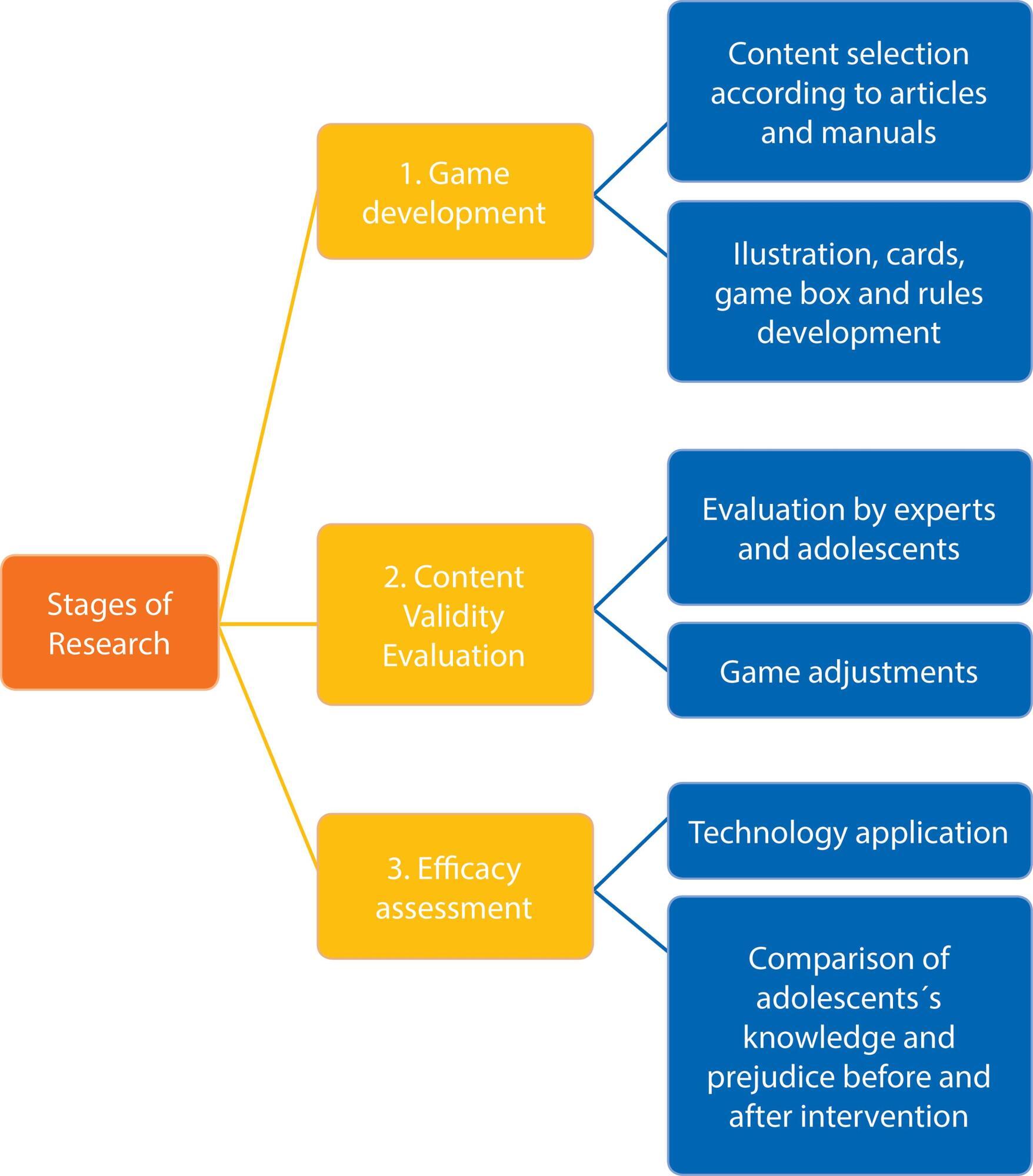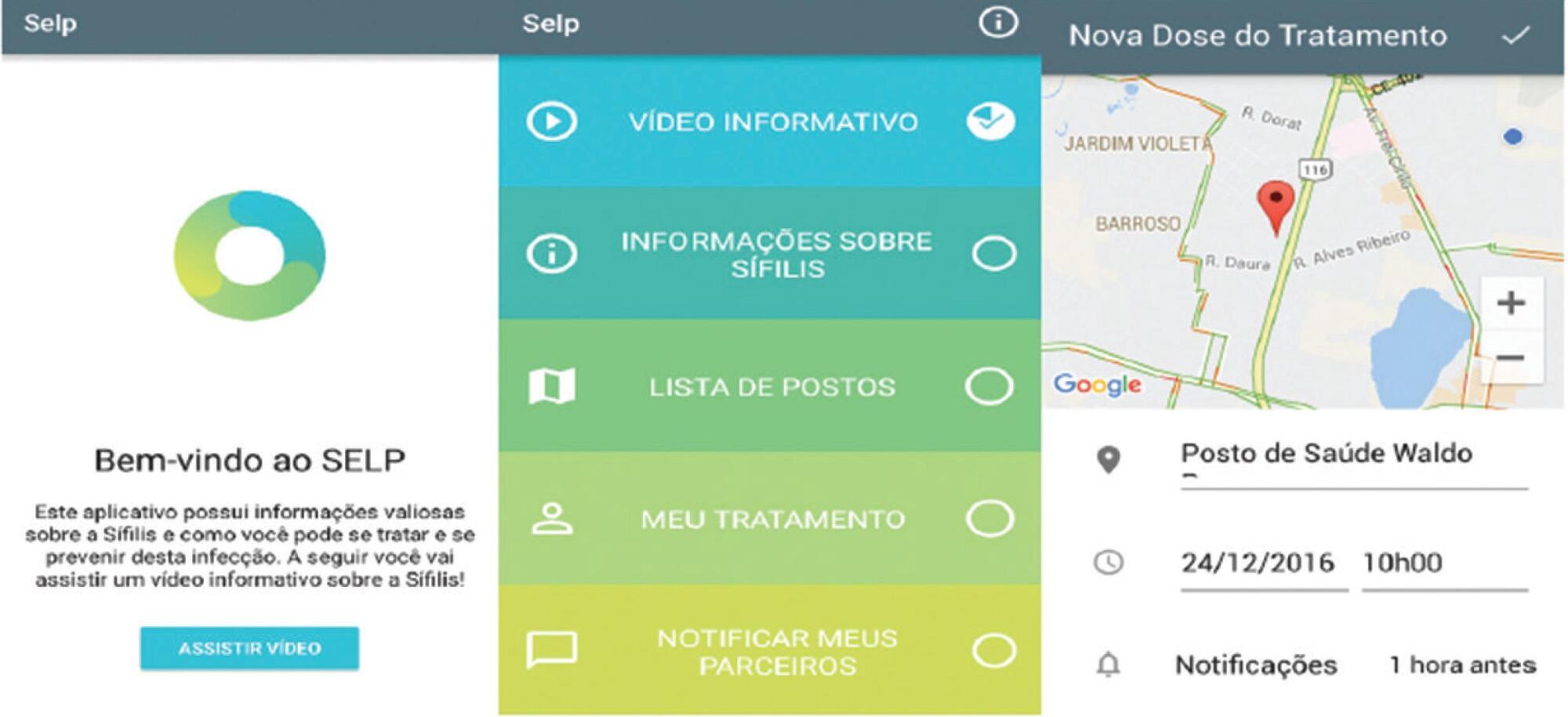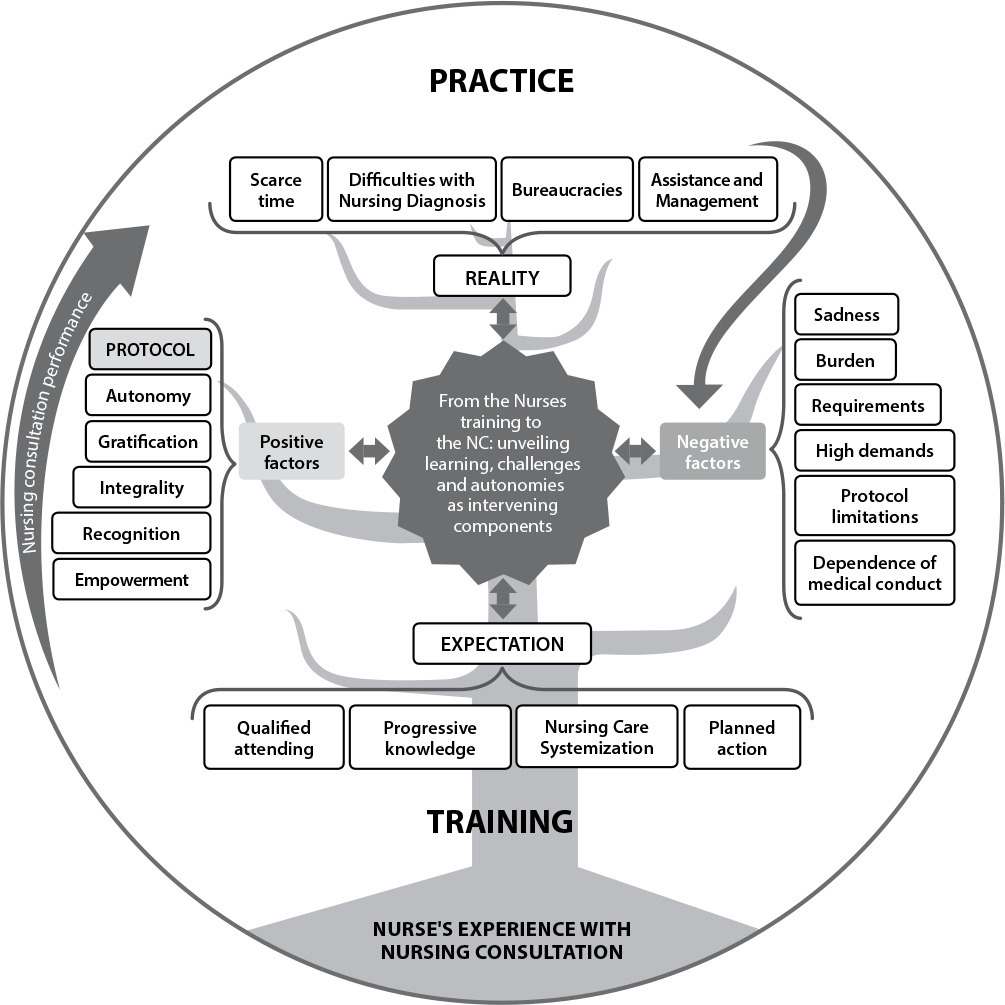-
01-01-2017
Pelvic floor rehabilitation program: report of 10 years of experience
Revista Brasileira de Enfermagem. 2017;70(1):231-235
Abstract
Pelvic floor rehabilitation program: report of 10 years of experience
Revista Brasileira de Enfermagem. 2017;70(1):231-235
DOI 10.1590/0034-7167-2016-0257
Views0See moreABSTRACT
Objective:
to relate the creation, experience of establishment and service performed in the Pelvic Floor Rehabilitation Program [(PRAP)], a project of the School of Nursing of University of Campinas (UNICAMP), developed at a health unity in Campinas, São Paulo, Brazil.
Results:
this Program appeared due to the high demand of patients with urinary incontinence (UI) and need of formation or qualification of professionals to serve those customers and multiply the actions at other health unities. Nowadays, the PRAP is in its tenth year, and it has served 102 patients with UI and other dysfunctions of the pelvic floor and lower urinary tract, qualified 480 health professionals and stimulated researches.
Conclusion:
the preventive actions of pelvic floor rehabilitation are important areas of the nurse’s performance and initiatives as the related ones contribute for the professional formation and practice based on evidences.
-
01-01-2017
Nursing process in mental health: an integrative literature review
Revista Brasileira de Enfermagem. 2017;70(1):220-230
Abstract
Nursing process in mental health: an integrative literature review
Revista Brasileira de Enfermagem. 2017;70(1):220-230
DOI 10.1590/0034-7167-2016-0031
Views0See moreABSTRACT
Objective:
to identify evidences from the literature on the application of nursing process in care developed by the nurse in mental health.
Method:
integrative literature review between 1990 and 2013, in the PubMed, Scopus, CINAHL and LILCACS bases. Descriptors: nursing processes, mental health, nursing care.
Results:
19 papers were identified. Limited and partial usage of the nursing process in care established by a therapeutic relationship that respects the patient’s individuality. We observe care proposals systematized for patients that present pathological aspects in the limits between the physical and psychical, which might be a response to the influence of the practice based on evidences.
Conclusion:
it was found an antagonistic movement between care based on the relationship and located in the standardization of diagnoses that respond to physical malaise. A lack of evidence was verified for the usage of the nursing process in mental health, and we point at the necessity for the creation of new possibilities for dialogue between relational and biological perspectives.
-
01-01-2017
Nursing practice in home care: an integrative literature review
Revista Brasileira de Enfermagem. 2017;70(1):210-219
Abstract
Nursing practice in home care: an integrative literature review
Revista Brasileira de Enfermagem. 2017;70(1):210-219
DOI 10.1590/0034-7167-2016-0214
Views0See moreABSTRACT
Objective:
analyze scientific production on nursing practice in home care.
Method:
integrative review employing databases LILACS, BDENF, IBECS, and MEDLINE. Studies in Spanish, English, and Portuguese were included, regardless of publishing date.
Results:
after analyzing 48 articles, it was found that nursing practice in home care is complex, employing a multitude of actions by using three technologies: soft; soft-hard especially; and hard. Challenges related to the home-care training process are reported in the literature. Nurses use knowledge from their experience and scientific recommendations in conjunction with their reflections on the practice.
Conclusion:
home nursing practice is fundamental and widespread. Relational and educational actions stand out as necessary even in technical care, with a predominant need for home-care training.

-
01-01-2017
Nonpharmacological interventions to improve quality of life in heart failure: an integrative review
Revista Brasileira de Enfermagem. 2017;70(1):198-209
Abstract
Nonpharmacological interventions to improve quality of life in heart failure: an integrative review
Revista Brasileira de Enfermagem. 2017;70(1):198-209
DOI 10.1590/0034-7167-2016-0112
Views0See moreABSTRACT
Objective:
to identify articles that assessed the effectiveness or efficacy of nonpharmacological interventions to improve quality of life of people with heart failure in the literature.
Method:
an integrative literature review was performed in Lilacs, MedLine and SciELO databases, including randomized or nonrandomized clinical trials and quasi-experimental studies published between 2003 and 2014, in Portuguese, English or Spanish.
Results:
twenty-three studies were included. The categories of nonpharmacological interventions that improved quality of life of people with heart failure were: Remote health monitoring, Instructions on health practices, Physical activity follow-up and Traditional Chinese Medicine practices.
Conclusion:
these results can guide the selection of interventions to be implemented by health professionals that treat people with heart failure. Future systematic reviews with meta-analyses are needed in order to identify the most effective interventions for improving these individuals’ quality of life.

-
01-01-2017
Quality of working life: assessment of intervention studies
Revista Brasileira de Enfermagem. 2017;70(1):189-197
Abstract
Quality of working life: assessment of intervention studies
Revista Brasileira de Enfermagem. 2017;70(1):189-197
DOI 10.1590/0034-7167-2015-0069
Views0See moreABSTRACT
Objective:
to analyze the production of knowledge about interventions on quality of working life.
Method:
integrative review study. The following databases were used for study selection: SciELO, Medline and PubMed.
Results:
the sample included 25 national and international articles that described programs and methods to acquire healthy habits at the workplace and attenuate its mental demands.
Conclusion:
by observing the number of businesses throughout the world, a low number of programs addressing workers’ health and well-being can be found, and the establishment of efficient policies at institutions could improve this situation.

-
REVIEW01-01-2017
Health literacy for people living with HIV/Aids: an integrative review
Revista Brasileira de Enfermagem. 2017;70(1):180-188
Abstract
REVIEWHealth literacy for people living with HIV/Aids: an integrative review
Revista Brasileira de Enfermagem. 2017;70(1):180-188
DOI 10.1590/0034-7167-2015-0052
Views0See moreABSTRACT
Objective:
to analyze knowledge produced by research about health literacy for adult with HIV/Aids.
Method:
an integrative literature review, using six databases, was conducted between January and April of 2014. The descriptors aids and Health Literacy were used, in Portuguese, English and Spanish. A total of 130 articles were found and 14 were selected. Three categories were identified: educational technologies and health literacy for HIV/Aids; assessment of health literacy of patients with HIV/Aids; and health literacy and adherence to antiretroviral therapy.
Results:
analysis of health literacy, socioeconomic status and educational level of people living with HIV/ Aids was essential for implementation of educational strategies that increased adherence to health guidance.
Conclusion:
this study showed the importance of health literacy for working with people living with HIV/Aids, especially considering individuals who did not possess the minimum necessary for survival, which makes it relevant and encourages further research on the topic.

-
01-01-2017
Letramento em saúde para pessoas com HIV/Aids: revisão integrativa
Revista Brasileira de Enfermagem. 2017;70(1):180-188
Abstract
Letramento em saúde para pessoas com HIV/Aids: revisão integrativa
Revista Brasileira de Enfermagem. 2017;70(1):180-188
DOI 10.1590/0034-7167-2015-0052
Views1See moreRESUMEN
Objetivo:
analizar el conocimiento producido por la investigación sobre la salud de alfabetización para adultos con VIH/SIDA.
Método:
una revisión integradora de la literatura, con seis bases de datos, se llevó a cabo entre enero y abril de 2014. Los descriptores SIDA y Educación de la Salud se utilizaron, en portugués, inglés y español. Se encontró un total de 130 artículos y se seleccionaron 14. Se identificaron tres categorías: tecnologías de la educación y alfabetización de la salud para el VIH/SIDA; evaluación de conocimientos sobre la salud de los pacientes con VIH/SIDA; y conocimientos sobre la salud y la adherencia a la terapia antirretroviral.
Resultados:
análisis de los conocimientos sobre la salud, el estatus socioeconómico y nivel educativo de las personas que viven con el VIH / SIDA era esencial para la implementación de estrategias educativas que el aumento de la adherencia a la orientación de la salud.
Conclusión:
Este estudio demostró la importancia de la alfabetización en salud para trabajar con personas que viven con el VIH / SIDA, especialmente teniendo en cuenta a las personas que no poseen el mínimo necesario para la supervivencia, lo que hace que sea aún más relevante y alienta la investigación sobre el tema.
-
01-01-2017
Factors that interfere with the response of nurses in the monitoring of clinical alarms
Revista Brasileira de Enfermagem. 2017;70(1):172-179
Abstract
Factors that interfere with the response of nurses in the monitoring of clinical alarms
Revista Brasileira de Enfermagem. 2017;70(1):172-179
DOI 10.1590/0034-7167-2015-0092
Views0See moreABSTRACT
Objective:
The objective of the present study was to identify and synthesize the best empirical evidence found on factors that influence the response of nurses regarding clinical alarms.
Method:
An integrative literature review was conducted with searches undertaken in ten electronic databases restricted to the period from 2005 to 2016.
Results:
Eight articles were included by cross-checking the descriptors selected.
Conclusion:
In the analysis of the studies, the following possible factors that might interfere with the response of nurses in the monitoring of clinical alarms were found: high number of false alarms, inaudibility of alarms due to the competition of sounds, difficulty in distinguishing the urgency of alarms, and increase in noise caused by the raise in the number of alarms.
-
06-11-2021
Resilience in elderly people: factors associated with sociodemographic and health conditions
Revista Brasileira de Enfermagem. 2021;74:e20200171
Abstract
Resilience in elderly people: factors associated with sociodemographic and health conditions
Revista Brasileira de Enfermagem. 2021;74:e20200171
DOI 10.1590/0034-7167-2020-0171
Views0See moreABSTRACT
Objective:
to describe the sociodemographic and health characteristics of elderly people, measure the score of total resilience and by sex and verify the association of sociodemographic and health variables with total resilience and by sex.
Methods:
this is a household survey with 808 elderly people, assessed by validated instruments. Student’s t test and multiple linear regression (p<0.05).
Results:
most were female, 60|-|79 years old. The total resilience score was 78.06, for men 81.53 and for women, 76.32. Total resilience was associated with males; positive self-perceived health; greater participation in Advanced Activities of Daily Living; fewer morbidities; absence of depressive symptoms. Among men and women, resilience was associated with greater participation in Advanced Activities of Daily Living and absence of depressive symptoms and, specifically, among women, positive self-perceived health.
Conclusion:
these results contribute to nursing care, aiming to encourage resilience.
-
REFLECTION03-05-2021
Reflections on patient safety incident reporting systems
Revista Brasileira de Enfermagem. 2021;74:e20200307
Abstract
REFLECTIONReflections on patient safety incident reporting systems
Revista Brasileira de Enfermagem. 2021;74:e20200307
DOI 10.1590/0034-7167-2020-0307
Views0See moreABSTRACT
Objective:
To reflect on the main characteristics and recommendations of Incident Reporting Systems, discuss the population’s participation in reporting, and point out challenges in the Brazilian system.
Method:
Reflection study, based on Ordinance No. 529/13, which instituted the National Patient Safety Program, under Collegiate Board Resolution (CBR) No. 36/13; reflections by experts were added.
Results:
Reporting systems are a source for learning and monitoring, allow early detection of incidents, investigations and, mainly, the generation of recommendations prior to recurrences, in addition to raising information for patients and relatives. There is little participation of the population in the reporting, regardless of the type of system and characteristics such as confidentiality, anonymity, and mandatory nature.
Final Considerations:
In Brazil, although reporting is mandatory, there is an urgency to advance the involvement and participation of the population, professionals, and institutions. To simplify data entry by improving the interface and importing data from the reporting system is an objective to be achieved.
-
ORIGINAL ARTICLE09-16-2019
Validation of Brazilian educational technology for disseminating knowledge on leprosy to adolescents
Revista Brasileira de Enfermagem. 2019;72(5):1333-1340
Abstract
ORIGINAL ARTICLEValidation of Brazilian educational technology for disseminating knowledge on leprosy to adolescents
Revista Brasileira de Enfermagem. 2019;72(5):1333-1340
DOI 10.1590/0034-7167-2018-0610
Views0See moreABSTRACT
Objective:
Elaborate and validate an educational technology for adolescents on leprosy, focusing on preventing the disease and reducing stigma.
Method:
First, a prototype of the educational technology was elaborated and later analyzed by 17 adolescents and 7 researchers’ experts in the leprosy area and educational technologies who answered a questionnaire with questions related to the subject. Subsequently, the technology has been applied to 43 adolescents, and a questionnaire was handed before and after the use of the game, so that questionnaire scores were compared by a Wilcoxon paired test.
Results:
After the data collection with researchers and adolescents, the answers received descriptive treatment, and the Content Validity Index was calculated, which reached a good level of agreement, with an overall value (0.86), although there were improvements to the technology, based on the perceptions of researchers and adolescents.
Conclusions:
There was an increase in knowledge about leprosy.

-
ORIGINAL ARTICLE09-16-2019
Development and evaluation of an application for syphilis control
Revista Brasileira de Enfermagem. 2019;72(5):1326-1332
Abstract
ORIGINAL ARTICLEDevelopment and evaluation of an application for syphilis control
Revista Brasileira de Enfermagem. 2019;72(5):1326-1332
DOI 10.1590/0034-7167-2018-0877
Views0See moreABSTRACT
Objective:
to develop and evaluate an application for syphilis control in pregnant women.
Method:
methodological research developed between March and November of 2016 in two phases: bibliographic survey of the years 2012 to 2016 in the databases PubMed, CAPES and Scopus and application development. Eight users participated in the usability test and five doctors and five nurses working in prenatal care participated in the evaluation.
Results:
the application contains informative video, information about the disease, map of health clinics, agenda function and anonymous notification. The evaluation of the objective, function and relevance was considered adequate with value higher than 0.80 in all items of the Content Validity Index.
Final considerations:
the application makes easier the routine of health services in the context of health promotion, in the convocation and treatment of pregnant women and their partners.

-
ORIGINAL ARTICLE03-30-2022
Nursing consultation in the Family Health Strategy and the nurse’s perception: Grounded Theory
Revista Brasileira de Enfermagem. 2022;75(4):e20201105
Abstract
ORIGINAL ARTICLENursing consultation in the Family Health Strategy and the nurse’s perception: Grounded Theory
Revista Brasileira de Enfermagem. 2022;75(4):e20201105
DOI 10.1590/0034-7167-2020-1105
Views0See moreABSTRACT
Objectives:
to understand the experience of nurses with nursing consultations in the context of the Family Health Strategy and propose a representative model.
Methods:
qualitative research using Grounded Theory, with 14 nurses working through non-directive interviews. For data analysis, three stages were used: open, axial and selective coding, which originated phenomena, themes, categories and subcategories, which supported the construction of the central category and, consequently, the theoretical model.
Results:
the interrelation of phenomena emerged from the essence of the nurse’s experience, revealing the central category: From nursing education to the practice of Nursing Consultation, unveiling learning, challenges and autonomy as intervening components. Final Considerations: the nurse’s experience is positive and, despite numerous challenges in daily life, the nurse has been performing it based on comprehensive care. New studies may add new understandings that enable the expansion of working conditions, valuing the nursing consultation.

-
ORIGINAL ARTICLE02-10-2020
Resources, objectives and guidelines in a Psychosocial Care Network structure
Revista Brasileira de Enfermagem. 2020;73(1):e20170864
Abstract
ORIGINAL ARTICLEResources, objectives and guidelines in a Psychosocial Care Network structure
Revista Brasileira de Enfermagem. 2020;73(1):e20170864
DOI 10.1590/0034-7167-2017-0864
Views0See moreABSTRACT
Objective:
to analyze a Psychosocial Care Network structure, based on the compromise of its resources and meeting objectives and guidelines recommended in Ordinance 3,088/2011.
Method:
an empirical, quantitative study with 123 primary care professionals, psychosocial and emergency care, who work at Western Network of the city of São Paulo. Questionnaires and statistical analysis were applied through the Exact Fisher’s test with 5% significance considering p= <0.05.
Results:
there is compromise of physical resources in the absence of mental health beds in a general hospital (p=0.047); of technological resources in the lack of discussion forums (p=0.036); of human resources in number of teams (p=0.258); and of financial resources (p=0.159). Psychosocial care is the one that most meets the objectives and guidelines.
Conclusion:
there are insufficient physical, technological, human, and financial resources for the work articulated in the three care modalities that are heterogeneous in terms of meeting the objectives and guidelines.
-
ORIGINAL ARTICLE02-25-2022
Assessment of the attributes of Primary Health Care with women of reproductive age
Revista Brasileira de Enfermagem. 2022;75(3):e20210015
Abstract
ORIGINAL ARTICLEAssessment of the attributes of Primary Health Care with women of reproductive age
Revista Brasileira de Enfermagem. 2022;75(3):e20210015
DOI 10.1590/0034-7167-2021-0015
Views0See moreABSTRACT
Objectives:
to evaluate the quality of Primary Health Care attributes according to the characterization and perspective of women of reproductive age.
Methods:
descriptive, quantitative, cross-sectional study, with 397 women of reproductive age from six municipalities in the 16th Health Region of the state of Paraná, with variables for sociodemographic characterization and the Primary Care Assessment Tool (PCATool).
Results:
mean age, 30.43 years old, most were married, 70.2% worked outside the home and 55.5% had completed high school. The highest average score of the eight domains evaluated was “Family Guidance” and “Coordination – Integration of Care”, with averages of 5.86 and 4.89. Domains “Integrality – Services Provided” and “Community Orientation” had lower averages (3.32 and 3.76).
Conclusions:
the study allowed tracing the characterization of the participants and identifying that the attributes of Primary Care are unsatisfactory, making it necessary to expand access to the services offered and to qualify the comprehensive care for women’s health.
-
ORIGINAL ARTICLE09-23-2022
Social entrepreneurship in the professional training in Nursing
Revista Brasileira de Enfermagem. 2022;75(3):e20220391
Abstract
ORIGINAL ARTICLESocial entrepreneurship in the professional training in Nursing
Revista Brasileira de Enfermagem. 2022;75(3):e20220391
DOI 10.1590/0034-7167-2021-0391
Views0See moreABSTRACT
Objectives:
to assess the knowledge and practices that stimulate social entrepreneurship in the professional training of Nursing students.
Methods:
qualitative exploratory-descriptive study carried out with 44 Nursing students from a University in the South Region of Brazil. Data were collected between May and August 2021, through individual online interviews. The participants were students of nursing course in the 6th semester or above, who had previously participated in teaching, research, or university outreach activities on entrepreneurship.
Results:
the data was organized and analyzed according to the thematic analysis technique and resulted in three thematic categories: Meanings of social entrepreneurship, Factors that sparked social entrepreneurship, and Recognizing oneself as an entrepreneurial nurse.
Final Considerations:
the knowledge and practices that stimulate social entrepreneurship in the professional training of Nursing students are associated with teaching, research and university outreach activities that allow concrete experiences in the living and dynamic world of communities.
Search
Search in:
Nuvem de Tags
Adolescente (85) Atenção Primária à Saúde (239) COVID-19 (91) Criança (91) Cuidados de Enfermagem (269) Educação em Enfermagem (151) Educação em Saúde (139) Enfermagem (930) Enfermagem Pediátrica (86) Estudantes de Enfermagem (77) Estudos de Validação (131) Família (87) Idoso (208) Promoção da Saúde (99) Qualidade de Vida (104) Saúde do Trabalhador (86) Saúde Mental (145) Saúde Pública (82) Segurança do Paciente (150) Tecnologia Educacional (100)



